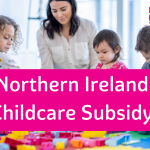All Party Group hears about the experience of support for childcare in ROI
The All Party Group on Early Education and Childcare, chaired by Nicola Brogan MLA, met remotely on Thursday 23 November 2023. This meeting brought together around 60 attendees including elected representatives, senior departmental officials and a wide range of stakeholders representing early education and childcare, the women’s sector, business, parents’ organisations and more.
The Chair provided an update on action points from the last meeting:
- Correspondence from the Department of Education Permanent Secretary Mark Browne confirmed significant work has been undertaken to identify costed options for the new Early Learning and Childcare Strategy and that there will be further engagement with the Stakeholder Engagement Forum. The Permanent Secretary provided assurance comprehensive stakeholder engagement, co-design and co-production will be essential to moving forward any options.
- Correspondence from the Department of Health Permanent Secretary Peter May acknowledged the importance of the review of the Minimum Standards and the issues that have been raised by the All Party Group. The Permanent Secretary advised the Family Policy Unit will be assessing workloads aiming to start the review as soon as possible.
She also highlighted the lack of any announcement on extending childcare support as part of the Chancellor’s Autumn Statement earlier in the week. The rise in the National Living Wage from April 2024, while welcome for the workforce, was identified as a real challenge for childcare providers who are already facing financial stress and recruitment and retention difficulties.
Reflecting on the difficult environment within which the sector is operating Nicola shared the example of a Playgroup she had spoken with earlier in the day having to close due to difficulties in recruitment. This was echoed by member Kate Nicholl MLA who highlighted that a day nursery in her constituency is consulting with parents on potentially dropping their service to a four day week citing challenges including rising operating costs, recruitment and issue with vetting procedures.
Kate proposed that the All Party Group write to the Secretary of State to seek an urgent meeting to discuss interim measures needed to support the sector, and the parents who rely on it, at this time of crisis. She also suggested organising a joint meeting with the All Party Working Group on Skills. Both actions were agreed by the Group.
Diane Dodds MLA, Vice-Chair, reflected on the cross-cutting nature of childcare and proposed writing to the Department of Finance to seek an update on any correspondence they have had with the Treasury about extending financial support for childcare, particularly through Tax-Free Childcare. This was also agreed by the Group.
Update from Department of Education: Progress on new Early Learning and Childcare Strategy
Tina Dempster, Head of the Childcare Strategy Team within the Department of Education, provided an update on ongoing work to develop costed options to inform the new Early Learning and Childcare Strategy. Her team has engaged with each of the political parties and is planning a visit to Dublin in December to learn more about funding models in Ireland. A meeting of the Stakeholder Engagement Forum is being planned and will provide an opportunity to review options and issues.
Update from Department of Health: Review of Minimum Standards planned for April 2024
Marc Bailie, Head of the Family Policy Unit within the Department of Health, advised that a team has now been allocated to take forward the Review of the Minimum Standards. Work will commence in April 2024, and it was agreed that this work will be the focus of a meeting of the All Party Group in March or April.
Core Funding in Ireland
Anne-Marie Brooks, Assistant Secretary at the Department of Children, Equality, Disability, Integration and Youth, provided an overview of Core Funding – a new funding scheme introduced in Ireland from September 2022 – and implications for the early learning and childcare sector. Anne-Marie’s presentation is available to download above. She explained the background to the scheme, developing out of recommendations from an Expert Group, and its operation in the context of existing forms of support for parents and for the sector. Core Funding, and a new Tackling Disadvantage fund, have been added to the National Childcare Scheme and the Early Childhood Care and Education Programme (up to two years of 15 hours free early childhood care and education for children of pre-school age). Initial funding of €221 million was secured in year 1 to support the roll out of the new scheme.
Core Funding has been designed to establish a new partnership relationship between providers and the state, reflecting the importance of early learning and childcare as a public good. The main objectives of the scheme are to improve:
- Affordability
- Accessibility
- Quality
- Workforce pay and conditions
- Sustainability and stability for the sector
- Operational and financial transparency.
These objectives inform the conditionality requirements that apply to the funding including Employment Regulations Orders, a freezing of fees for parents, the development of a quality action plan and financial reporting. The core funding base rate is calculated based on staff capacity within a setting, rather than on occupancy, recognising that occupancy can fluctuate. The rate is higher for younger children and there is a premium for rooms led by a graduate. Participation in the scheme has been very high, with 94% of services participating to date.
Reflecting on the achievements of the scheme, Anne-Marie highlighted:
- A reduction in fees for parents
- A significant expansion in capacity across the sector
- A 5 year low in terms of net closures in the sector
- Pay increases for those working in the sector.
Annual uplifts in funding have been secured. In year 3 of the scheme this will rise to €331 million enabling the Core Funding allocation to be increased. This will also offer scope to work in partnership with the sector to address issues that have been raised with the implementation of the scheme and plan for future fee management.
Core Funding – a provider’s perspective
Stuart Buchanan, Head of Children & Family Services at YMCA Dublin, followed by sharing a provider’s experience of Core Funding. Stuart’s presentation can be accessed here. Stuart gave an overview of YMCA childcare provision across Ireland on a social economy model, with plans for expansion in Dublin over the next 5 years. Profits are invested in wrapround family support and subsiding places. Having received Core Funding of over €331,000 in year 1 of the scheme YMCA Dublin froze parent fees at their September 2019 level. Feedback from parents using their childcare services also highlights the positive impact of the National Childcare Scheme. Without the subsidy:
- Half of parents reported they would have to reduce their work, training or study hours
- Around a third would have to give up work, training or study altogether
- A quarter would have to rely on family or friends for childcare.
Stuart offered insight, from a provider’s perspective, into what is going well with Core Funding and what could be improved. For example, affordability has improved for parents – of particular significance during the cost of living crisis. However, the scheme was introduced during peak inflation which has been a challenge for providers. Staff and sectoral recognition has been enhanced with agreed rates of pay and support for graduate recruitment. But recruitment and retention challenges remain, and there are no regional variations in rates of pay.
Stuart closed reflecting on the importance of supply-side support for the sector facilitating equitable access and quality of provision. There is scope for further targeted supports and the consideration of regional variations. Uplifts are essential to ensure support is adequate for parents and providers. Critically, he closed by highlighting that reduced fees and enhanced provision benefit children and families as well as the wider community and economy.
Essential learning for the development of a new Early Learning and Childcare Strategy
The detailed questions and discussions that followed the presentations reflected the invaluable learning they offered for the development of the new Early Learning and Childcare Strategy in Northern Ireland – and the strong engagement of members, elected representatives and stakeholders.
Anne-Marie provided further detail on the allocation of funding based on capacity rather than occupancy, offering stability to providers and avoiding fluctuation. She also highlighted plans to extend existing support to facilitate the inclusion of children with additional needs as part of wider policy development aimed at tackling disadvantage.
Highlighting that there is no distinction made between early learning and childcare – childcare settings are recognised as providing both care and early learning for children – Core Funding is open to any Tusla registered provider alongside the full range of support schemes for the sector and for families. While very few childminders are registered with Tusla work is underway to get childminders registered by 2028 and plans are being developed to pilot Core Funding with childminders.
As a result of childcare subsidies it is anticipated that, by next year, parents’ fees will have reduced overall by around 50%. Ireland has seen the fastest decrease in net childcare costs across the OECD, and modelling shows a positive impact on supporting women to move into work and to work longer hours.
There is ambition, through continuing investment, to further enhance rates of pay for those working in the sector and develop career pathways and progression. This is part of a wider workforce plan to nurture skills, enhance access to CPD and develop a strong professional identify.
Stuart reflected that Core Funding has allowed YMCA Dublin to hold fees at their 2019 levels while continuing to invest in their wraparound support for young people and families. Without Core Funding this would not have been possible without a significant increase in fees for parents. It has also been critical to bringing experienced practitioners into the setting with better structures for recruitment and progression, however there is still a lot of work to be done in this regard.
Anne-Marie highlighted the critical role of robust, timely data in informing the ongoing development of Core Funding and other childcare subsidies. An Early Learning and Childcare Stakeholder Forum offers a vehicle for ongoing engagement with the sector. Together with data gathering from services and independent evaluation, this offers an opportunity for issues to be raised and addressed.
Thanks to speakers, members and stakeholders for their engagement
Commenting on the meeting, Chair Nicola Brogan MLA thanked the speakers, the members, and all those who attended:
“This All Party Group provided real insight into the impact of ambitious investment in the South for childcare providers and for families. I would like to sincerely thank each of our excellent presenters for their time and the insights they shared. We have a real opportunity to learn from the achievements of the Core Funding scheme, and the issues that have been identified, in order to develop a bespoke solution.
What we heard reflects the significant potential that investment in our early learning and childcare sector can deliver across our society and economy as a whole. As the challenge grows for the sector here and for the families who rely on it, today’s discussion reinforced the need for urgent action on childcare which must be a day-one priority for a restored Executive.”
Looking ahead
The Chair closed the meeting by thanking all stakeholders for their continued high level of engagement with the All Party Group and advised that the next meeting will be held early in the new year, focusing on the quality of childcare provision in Northern Ireland.
Find out more about the All Party Group on Early Education and Childcare
Further information on the All Party Group on Early Education and Childcare, including links to read more about previous meetings, is available here.
Employers For Childcare provides the Secretariat for the All Party Group on Early Education and Childcare – correspondence to strategy@employersforchildcare.org.






